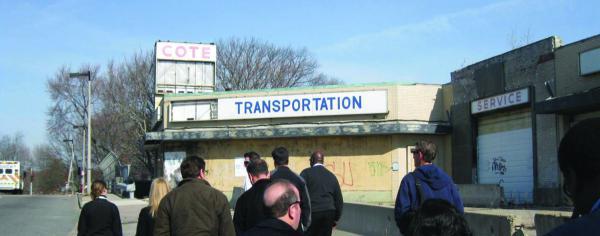June 5, 2014

The Cote Ford building on Cummins Highway.
A fledgling immigrant service group hopes to become the developers of the long vacant Cote Ford site on Cummins Highway in Mattapan, building a multi-million dollar center to serve Boston’s growing Caribbean population.
Caribbean Integration Community Development offers services to that immigrant community, including finding housing for immigrants and working on economic development and policy that benefits Caribbean immigrants, according to organization president Donald Alexis.
But a service center, which would be the centerpiece of the organization’s plan to develop the Cote Ford site, would allow them to do much more, he said.
“It is an ideal location if we’re going to have a Caribbean center in Mattapan,” Alexis said. “It is accessible from all forms of public transportation and there are a decent amount of Caribbean people living there, too.”
Alexis said he could not offer specifics of the plan, which is still under development, but said the total cost of the plan would be about $3.6 million.
“The project would include housing, activities for youth and elderly, and it would include incubators for small businesses in Boston,” Alexis said.
Building the center itself would constitute about $2.8 million of the cost and $1.8 million would be spent to remediate the site, according to Alexis.
Part of the site was used as a car dealership and underground gasoline storage tanks and contaminated soil were removed from the site in the 1980s and 1990s, Boston Senior Environmental Compliance Manager James Smith said at a presentation about the site in March.
The site is clear for industrial and commercial use, but a proposal like that from the Caribbean Integration Community Development organization, which includes residential housing, would require further remediation, city consultant Matthew E. Robbins said at the March presentation.
The Cote Ford site consists of properties at 820 Cummins Highway, 30 Regis Road, and two vacant lots on Cummins Highway and Regis Road. The total size of all the properties is about 114,000 square feet, with an assessed value of just over $1 million.
Alexis said his organization’s plan would involve bidding for three of the properties while partnering with five unnamed development partners.
Full site plans will be released and presented to the public in late August or September, along with a plan to finance the proposal, according to Alexis. Alexis added that money for the project would come from a combination of private and public funding.
At the March presentation, many attendees were anxious to have the Cote Ford site developed and that the development would bring jobs to the area.
In a recent phone interview, Mattapan United member Lincoln Larmond said he was potentially supportive of the idea.
“Any time you have an organization that wants to come into the community and improve access to economic opportunities, it is a win-win for the community,” Larmond said.
Larmond said the center also could potentially fill the gap left by the Caribbean Cultural Center, which was active through the 1990s and early 2000s, according to Larmond. The center provided a place for music and games, but closed after police began to be regularly called to the site for disturbances, according to Larmond.
Alexis said he hoped the center and the Caribbean Integration Community Development organization could aide other service organizations by giving them a centralized location to offer their services, including currently under-enrolled English as a Second Language classes.
“If you’re looking in Four Corners, you have six or seven organizations or learning centers offering ESL,” Alexis said. “If we could have ESL classes two or three times a week in the center, each organization could teach ESL at a specific time and more people would come to the class.”
The organization has been around for three years, but one of the challenges Alexis faces is that the Caribbean community itself is diverse, including Caucasians, Hispanics, and African Americans.
“We started the organization in the community because there is no organization that caters to the Caribbean community,” Alexis said.
At the same time, the Caribbean community makes up about 25 percent of Boston’s immigrant population, with the largest populations in Mattapan and the Four Corners area of Dorchester, Alexis said.
If the idea is approved, Alexis hopes the facility could be built within 18 months.
For more information about the Caribbean Integration Community Development organization, visit cicdofboston.org.
Villages:
Topics:


